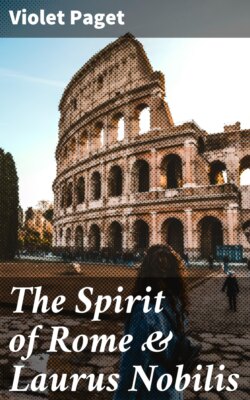Читать книгу The Spirit of Rome & Laurus Nobilis - Violet Paget - Страница 4
На сайте Литреса книга снята с продажи.
II. A PONTIFICAL MASS AT THE SIXTINE CHAPEL.
ОглавлениеTable of Contents
I never knew so many hours pass so pleasantly as in this tribune, surrounded by those whispering, elbowing, plunging, veiled women in black, under the wall painted with Perugino's Charge of St. Peter, and dadoed with imitation Spanish leather, superb gold and blue scrolls of Rhodian pomegranate pattern and Della Rovere shields with the oak-tree.
My first impression is of the magnificence of all these costumes, the Swiss with their halberts, the Knights of Malta, the Chamberlains like so many Rubenses or Frans Halses, the Prelates and cardinals, each with his little train of purple priestlets; particularly of the perfection in wearing these clothes, something analogous to the brownish depth of the purple, the carnation vividness of the scarlet, due to all these centuries of tradition. At the same time, an impression of the utter disconnectedness of it all, the absence of all spirit or meaning; this magnificence being as the turning out of a great rag bag of purple and crimson and gold, of superb artistic things all out of place, useless, patternless, and almost odious: pageantry, ritual, complicated Palestrina music, crowded Renaissance frescoes, that huge Last Judgment, that mass of carefully grouped hideous nudities, brutal, butcher-like, on its harsh blue ground; that ceiling packed with superb pictures and figures, symmetrical yet at random, portentous arm and thighs and shoulders hitting one as it were in the eye. The papal procession, white robes, gold candlesticks, a wizen old priest swaying, all pale with sea-sickness, above the crowd, above the halberts and plumes, between the white ostrich fans, and dabbing about benedictions to the right and left. The shuffle of the people down onto their knees, and scuffle again onto their feet, the shrill reading of the Mass, and endless unfinished cadences, overtopped by unearthly slightly sickening quaverings of the choir; the ceaseless moving about of all this mass of black backs, veils, cloaks, outlines of cheek and ear presenting every now and then among the various kinds of rusty black; no devotion, no gravity, no quiet anywhere, among these creatures munching chocolates and adjusting opera-glasses. M.P.'s voice at my ear, now about Longus and Bonghi's paganism, now about the odiousness of her neighbour who won't let her climb on her seat, the dreadful grief of not seeing the Cardinal's tails, the wonderfulness of Christianity having come out of people like the Apostles (I having turned out Gethsemane in St. Matthew in the Gospel which she brought, together with a large supply of chocolate and the Fioretti di S. Francesco), the ugliness of the women, &c. &c. And meanwhile the fat pink profile perdu, the toupé of grey hair like powder of a colossal soprano sways to and fro fatuously over the gold grating above us.
All this vaguely on for a space of time seeming quite indeterminate. Little by little, however, a change came over things, or my impression of them. Is it that one's body being well broken, one's mind becomes more susceptible of homogeneous impressions? I know not. But the higher light, the incense, fills the space above all those black women's heads, over the tapers burning yellow on the carved marble balustrades with the Rovere arms, with a luminous grey vagueness; the blue background of the Last Judgment grows into a kind of deep hyacinthine evening sky, on which twist and writhe like fleshy snakes the group of demons and damned, the naked Christ thundering with His empty hand among them; the voices moving up and down, round and round in endless unended cadences, become strange instruments (all sense of register and vocal cords departing), unearthly harps and bugles and double basses, rasping often and groaning like a broken-down organ, above which warbles the hautboy quaver of the sopranos. And the huge things on the ceiling, with their prodigious thighs and toes and arms and jowls crouch and cower and scowl, and hang uneasily on arches, and strain themselves wearily on brackets, dreary, magnificent, full of inexplicable feelings all about nothing: the colossal prophetic creature in green and white over the altar, on the keystone of the vault, striking out his arms—to pull it all down or prop it all up? The very creation of the world becoming the creation of chaos, the Creator scudding away before Himself as He separates the light from the darkness. Chaos, chaos, and all these things moving, writhing, making fearful efforts, in a way living, all about nothing and in nothing, much like those voices grating and quavering endlessly long.
Rome, March 4, 1888.
